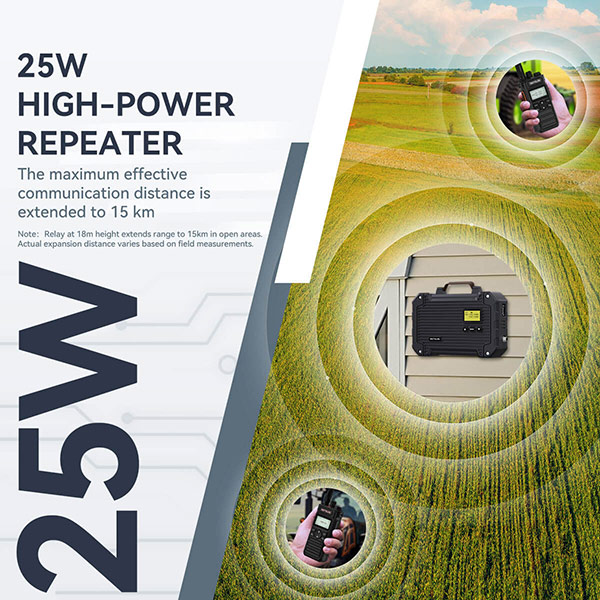The Role of Two Way Radio Repeaters in Emergency Communications

The Role of Two Way Radio Repeaters in Emergency Communications
Introduction
When disaster strikes—whether a natural catastrophe, power outage, or public safety crisis—reliable communication is critical. Traditional cellular networks often fail under heavy load or physical damage, leaving first responders and emergency teams without connectivity. Two-way radio repeaters fill this gap by ensuring uninterrupted, long-range communication when it matters most.
Among the most robust solutions is the RT97L repeater, featuring 25W power output, IP66 waterproof rating, and extreme-range capabilities. Designed for harsh conditions, it’s an essential tool for fire departments, search & rescue (SAR) teams, and disaster response units.
Why Two-Way Radio Repeaters Are Vital in Emergencies
1. Maintaining Communication When Networks Fail
-
Cellular towers can go down due to storms, floods, or overload.
-
Radio repeaters create independent networks, ensuring first responders stay connected.
2. Extending Coverage in Challenging Terrain
-
Mountains, forests, and urban structures block signals.
-
A 25W repeater like the RT97L boosts range, eliminating dead zones.

- RT97L Two Way Radio Repeater
3. Weatherproof & Durable (IP66 Rating)
-
Emergency operations often happen in rain, snow, or dust.
-
The RT97L’s IP66 protection ensures reliability in extreme conditions.
4. Instant, Uncomplicated Communication
-
Unlike phones, radios provide push-to-talk (PTT) immediacy—no dialing or waiting.
-
Critical for coordinating evacuations, medical teams, and law enforcement.
5. Cost-Effective & Low Maintenance
-
No recurring fees (unlike cellular/satellite solutions).
-
Once installed, repeaters work for years with minimal upkeep.
Key Features of the RT97L for Emergency Use
25W High-Power Transmission
-
Covers vast areas —ideal for large-scale disasters.
-
Ensures communication between command centers and field teams.
IP66 Waterproof & Dustproof
-
Resists heavy rain, snow, and debris—crucial for outdoor emergencies.
Solar/Battery-Powered Readiness
-
Works with off-grid power (solar panels/generators) if electricity fails.
Compatible with Standard Radios
-
Integrates seamlessly with UHF/VHF emergency radios used by first responders.
FCC-Certified & Interference-Resistant
-
Avoids signal clashes during multi-agency responses.
Real-World Emergency Applications
1. Firefighting Operations
-
Coordinates teams in smoke-heavy or remote wildfire zones.
2. Search & Rescue (SAR) Missions
-
Maintains contact in forests, mountains, or disaster rubble.
3. Hurricane/Flood Response
-
Functions when cell towers are down or submerged.
4. Law Enforcement Crowd Control
-
Ensures real-time updates during riots or public crises.
5. Hospital Emergency Coordination
-
Links ambulances, triage units, and central command.
How to Deploy a Repeater for Emergency Preparedness
-
Strategic Placement
-
Install on high elevations (towers, rooftops) for maximum coverage.
-
-
Redundant Power Sources
-
Use solar panels or backup batteries for 24/7 readiness.
-
-
Regular Testing
-
Simulate blackout scenarios to ensure reliability.
-
-
Team Training
-
Train personnel on repeater protocols for seamless adoption.
-
Conclusion: A Lifeline When Every Second Counts
In emergencies, communication breakdowns cost lives. Two-way radio repeaters like the RT97L provide a weatherproof, high-power, and fail-safe solution—ensuring first responders can operate even when infrastructure collapses.
For agencies prioritizing reliability over cellular dependence, the RT97L’s 25W output and IP66 durability make it an indispensable tool.
Prepare today—because when disaster strikes, silence is not an option.






